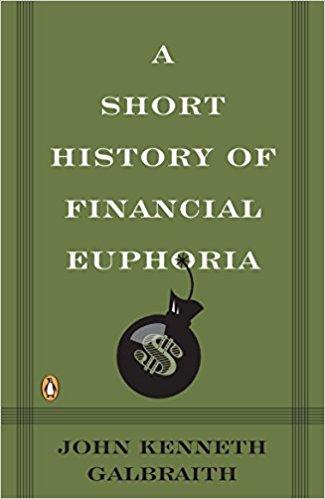A Short History of Financial Euphoria Summary
7 min read ⌚
 Ready for a new speculative bubble?
Ready for a new speculative bubble?
Because as John Kenneth Galbraith’s “A Short History of Financial Euphoria” demonstrates, if there’s one thing history has taught us it’s that there will surely be one very soon.
Read ahead to find out why.
Who Should Read “A Short History of Financial Euphoria”? And Why?
In “A Short History of Financial Euphoria,” John Kenneth Galbraith offers “dourly irreverent analyses of financial debacle from the tulip craze of the seventeenth century to the recent plague of junk bonds.”
Chances are you’ll forget the origin and the effects of all of them in the blink of an eye, which will expose you to the manipulative schemes of charlatans and cons in no time.
Which is why it’s all but necessary to not merely read, but also constantly reread Galbraith’s 100-page classic.
 About John Kenneth Galbraith
About John Kenneth Galbraith
John Kenneth Galbraith was a Canadian-born economist and diplomat, one of the leading proponents of American liberalism of the 20th century.
A long-time Harvard faculty member and professor, Galbraith served in the administrations of four American presidents (Roosevelt, Truman, Kennedy, Johnson).
One of the few people to receive both the Medal of Freedom and the Presidential Medal of Freedom, Galbraith was USA’s Ambassador to India under Kennedy and a widely respected public intellectual for the duration of the Cold War.
A prolific author, he wrote numerous books, including a few successful novels. His trilogy on economics – “American Capitalism,” “The Affluent Society” and “The New Industrial State” – is still hotly debated and thoroughly analyzed.
“A Short History of Financial Euphoria PDF Summary”
There is nothing in economic life,” writes John Kenneth Galbraith near the end of his “Short History of Financial Euphoria,” so willfully misunderstood as the great speculative episode.
And this, even though on the face of it, everything should be quite plain and simple.
It all starts with a bidding war over some asset a few people believe is so rare and important that its value should only increase in the future.
That’s, after all, the basic economic rule: when supply is low, and demand is great, prices rise.
Add to this the yearning desire of many people to become rich overnight, and you get a recipe for disaster!
Because soon enough, investors join in.
Why should they not?
It’s their job to get the most out of anything, and bubbles are the perfect way for them to earn some money.
And since they are usually the earliest players, they actually do – and they do it big time!
Of course, these investors are not exactly humble people, so they start tooting their own horns, and soon even more people start investing in the asset the price of which, in the meantime, has blown ridiculously out of proportions.
The scary thing is that in this second group of people there are usually even quite a few intelligent analysts who are aware that at some point in the future this bubble must burst, but who, nevertheless, expect to be able to take their money back before that happens.
Some do. Most don’t.
And when the inevitable happens – the market crash – many lose substantial amounts of money; many more lose absolutely everything.
The strange thing: in a decade or so, financial euphoria strikes again.
Why?
In the opinion of Galbraith, it is because of several unchanging factors.
Since these are probably the most important insights of his book but are mostly scattered through brilliant historical analyses of many speculative bubbles, we tried to systematize them so that you can follow them better.
#1. Short-term fiscal memory
When it comes to money, Galbraith says, people never seem to learn anything. “There can be few fields of human endeavor,” he says, “in which history counts for so little as in the world of finance.”
In other words, when it comes to get-rich-fast schemes, you can burn yourself numerous times, because wanting more is part of your very human nature.
Rationality is just a note on the margin.
#2. The fallacious link between wealth and intellect
Most people believe that wealthy investors are, by definition, smart.
Which is why they have devised all those fancy epithets about the likes of Warren Buffet, Peter Lynch, and George Soros!
However, since almost everything that happens in life and in the markets is governed by chance, it’s all but crazy to believe that some people have found a surefire way to earn money.
In fact, most of the time, they have just been lucky.
The majority doesn’t think so.
So, it is inclined to be the victim of Ponzi schemes and speculative bubbles.
#3. Nobody believes the pessimists
Almost every bubble comes with a Cassandra or two.
Before the market crash of 1929, Paul M. Warburg foresaw the collapse and the depression, but his warnings fell on deaf ears, with the public claiming that he (a Jew) was “sandbagging American prosperity.”
Most wanted to believe Irving Fisher who famously proclaimed that the “stock prices have reached what looks like a permanently high plateau.”
Just a few days before the market crashed.
#4. Everyone chooses to ignore the real reasons
Charles Mackay, in his remarkable 1841 classic “Extraordinary Popular Delusions and the Madness of Crowds” (a defining influence on Galbraith’s book which thoroughly recounts its three chapters), commenting on the South Sea Company bubble, writes thus:
[In the autumn of 1720,] public meetings were held in every considerable town of the empire, at which petitions were adopted, praying the vengeance of the legislature upon the South Sea directors, who, by their fraudulent practices, had brought the nation to the brink of ruin. Nobody seemed to imagine that the nation itself was as culpable as the South-Sea company. Nobody blamed the credulity and avarice of the people-the degrading lust of gain…or the infatuation which had made the multitude run their heads with such frantic eagerness into the net held out for them by scheming projectors. These things were never mentioned.
The truth is – these things never are.
Even though:
#5. Bubbles are an inherent part of the market
Speculation is part of the market, and it will always be that way.
Contrary to what many will say, the market is not infallible, since humans are not infallible as well.
Regulations can help, but even they can’t contain mass euphoria and gullibility.
So, as long as there are people and markets, there will be bubbles as well.
Key Lessons from “A Short History of Financial Euphoria”
1. People Suffer from a Short-Term Fiscal Memory
2. Believe the Pessimists – for Your Own Sake
3. Bubbles Are Inherent Part of the Free-Enterprise System
People Suffer from a Short-Term Fiscal Memory
When it comes to money, people tend to forget everything, including the most disastrous financial crashes in but a few decades.
That’s why it’s too optimistic to hope that people will ever learn their lesson when it comes to speculative bubbles.
Believe the Pessimists – for Your Own Sake
Every speculative bubble comes with a Cassandra or two: a prophet of disaster whose prophecies nobody believes until it’s too late.
Unfortunately, more often than not – or, rather, for most of the people involved – they are the only ones who are actually right.
Could it be that the pessimists are also right in the case of, say, Bitcoin?
Bubbles Are Inherent Part of the Free-Enterprise System
Markets are not perfect.
Bubbles are a part of them, and, as long as there are markets, it is inevitable that many people will lose huge amounts of money due to ruinous speculation.
The earlier you realize this, the better for you.
Like this summary? We’d like to invite you to download our free 12 min app, for more amazing summaries and audiobooks.
“A Short History of Financial Euphoria Quotes”
The circumstances that induce the recurrent lapses into financial dementia have not changed in any truly operative fashion since the Tulipomania of 1636-1637. Share on X
The world of finance hails the invention of the wheel over and over again, often in a slightly more unstable version. Share on X
There is nothing in economic life so willfully misunderstood as the great speculative episode. Share on X
Speculation buys up, in a very practical way, the intelligence of those involved. Share on X
In a world where for many the acquisition of money is difficult and the resulting sums palpably insufficient, the possession of it in large amounts seems a miracle. Share on X
Our Critical Review
“Financial Euphoria” – to quote a great review – is a keeper, the sort of book you’ll recommend to other investors. It is brief, readable, with a statesman-like style, yet not above the heads of small investors.
Originally, Galbraith wrote it as a warning. Unfortunately, as he explains in the Foreword to the book’s second edition, a warning he grew to believe that has no value whatsoever:
In the first foreword to this volume, I told of my hope that business executives, the inhabitants of the financial world and the citizens of speculative mood, tendency or temptation might be reminded of the way that not only fools but quite a lot of other people are recurrently separated from their money in the moment of speculative euphoria.
I am less certain than when I then wrote of the social and personal value of such a warning. Recurrent speculative insanity and the associated financial deprivation and larger devastation are, I am persuaded, inherent in the system. Perhaps it is better that this be recognized and accepted.
Unsurprisingly, Galbraith ends his book with a depressing question: “When will come the next great speculative episode and in what venue will it recur?”
That was 1994.
Unfortunately, we know now the answer.
And, yet – frighteningly – the question is still valid.
Emir is the Head of Marketing at 12min. In his spare time, he loves to meditate and play soccer.


 About John Kenneth Galbraith
About John Kenneth Galbraith




